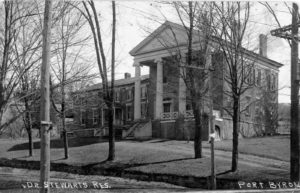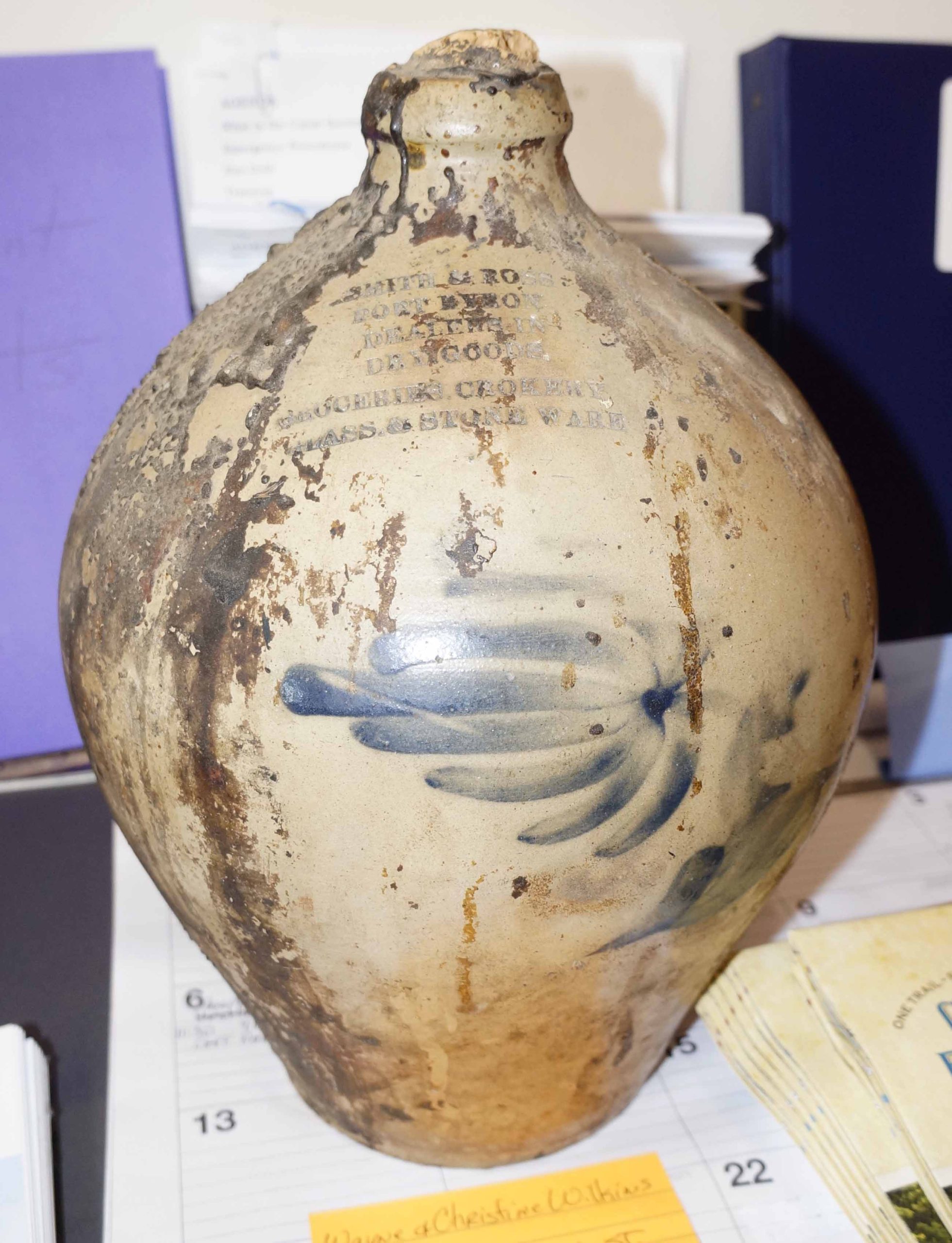Sometimes the most simple of objects can lead us down a interesting path. I recently received a photo of a earthenware jug from our friends at the Canal Society of New York State with the stamp; “Smith and Ross- Port Byron Dealers in Dry Goods- Groceries- Crockery- Glass and Stone Ware.” I knew both the names as David Smith and Elmore Ross were prominent local businessmen. And if you have ever gazed at the grand old Greek Revival on the corner of Main and Pine and thought to yourself, “I wonder who built that house”, you have inadvertently thought of David B. Smith as it was his home. It was indeed a home befitting a wealthy man.

In 2012, village historian Dawn Roe helped to research a very good article about a 1838 Smith and Ross banknote. The article gives a nice history of the use of paper money in this period of history and looks at the partnership of Smith and Ross. But there had to be more, and there was.
In 1825, David and his wife Sarah (nee Sayre) moved to Port Byron from Orange County, New York. They may have lived in New Windsor. Of course 1825 is note-worthy because it is the year that the Erie Canal was completed across the state. The Smith’s set up a store on the banks of the new canal, and Brigham Young later noted that he had painted “Goods for Sale” signs for this business. Elmore, who was eleven years younger, went to work for Smith, and sometime after was offered a partnership. A 1834 canal survey shows that the business was located on the south side of the canal near the north corner of Pine and Main (across from David’s house). In 1836, David was one of a group that founded the Port Byron and Conquest Turnpike Road. This toll road started in Port Byron and ran to the bridge at Mosquito Point. In 1837, a couple note worthy events took place. The first was an economic panic slowed the business of the country, and causing many businesses to go bankrupt. As I found ads for Smith and Ross in 1839, it appears that the business survived the depression. The second event was that 1837 was the year that the village was incorporated. Elmore P Ross was named as the first village president, and David was named as the treasurer.
However, shortly after, something happened between the two men. A 1845 newspaper article mentions that Ross and Smith were supporting rival canal packet lines and both men were operating their own stores along the canal. News about David Smith comes up again in 1857 as one of nine commissioners for the new Port Byron Free School District. The year of 1857 was also the year that the country suffered through another financial panic, which again is another note-worthy date as this panic may have ruined Smith.
Thomas, who was one of David’s sons, either had his own store or was running his father’s store. A 1859 court case stated that David had either co-signed, or perhaps that Thomas had used David’s good name to back some business loans worth $5500 (about $120,000 today). The case goes onto say that both David and Thomas found themselves embarrassed by their inability to repay the loans. And then in the 1860 census, we see that David was listed as a farmer with a worth of $1000. David died in 1869, and thus far, I cannot find a obituary for him. It is a shame that no mention can be found about a man who accomplished so much.
Life took a different course for Elmore Preston Ross. Ross was born in Dutchess County and moved to Bucksville (Port Byron) in 1811. In 1835, he married Caroline Akin, the daughter of Ethan, who was one of the first millers in the village. In the mid 1840’s, Ross purchased the prison shoe manufacturing company which turned out many foot-ware articles. However a later article noted that no one ever made money running the prison business. The Ross family moved to Auburn about this time.
Aside from the shoe business, Ross was a very successful businessman. He served as the Auburn Postmaster, as the president of the First National Bank, as the president of the Merchants Union Express Company, and as the president of the Southern Central Railroad Company. In 1871, Ross purchased the Associated Press franchise and turned the Auburn Daily News into a democratic paper. Although he ran for office a few times, he was never successful, however, his son Charles would become the Mayor of Auburn in 1874 and then go onto become the New York State Treasurer in 1876. (Charles would disappear in 1880, but I will leave that story to the Auburn historian.) When he died in 1879, Elmore was worth between 250,000 to 350,000 dollars.
The jug certainly has an interesting story to tell.
